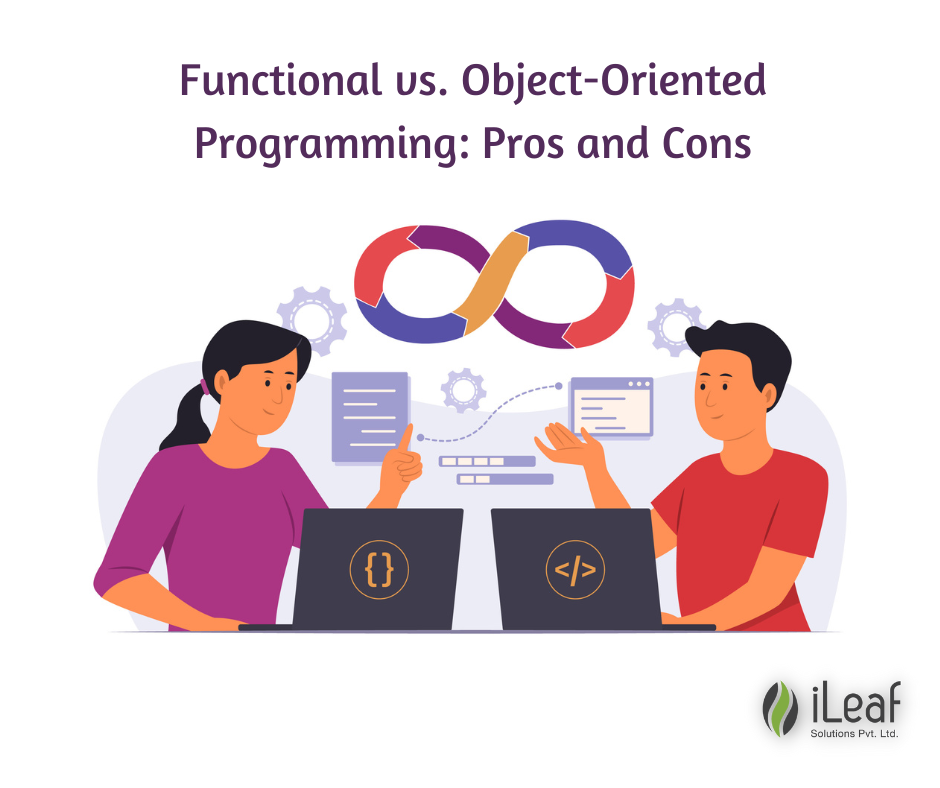Functional vs. Object-Oriented Programming: Pros and Cons

Overview
Introduction
In today's technology-driven world, programming languages play a crucial role in developing applications and software. Among the many methodologies, functional and object-oriented programming are often debated. This blog post aims to provide an in-depth comparison of functional and object-oriented programming, discussing the pros and cons of each approach.
Functional Programming:
When using the functional programming paradigm the main priority lies in evaluating functions, striving to negate state changes and ensure no mutable data is altered. Adhering to principles of mathematics, this method prioritizes utilizing functions to reach a desired outcome. Generally, modelling value based on offering notable languages as examples like Haskell, Lisp or Erlang will enable success within this ideology.
Advantages and Disadvantages of Functional and Object-Oriented Programming
Pros of Functional Programming:
1. Easier Debugging: Functional programming is deterministic, meaning that a function will always produce the same output for the same input. This makes it easier to debug and test the code, as developers can isolate and fix errors without worrying about side effects.
2. Immutability: Functional programming practices limit the alteration of data, reducing the probability of corrupted data or side effects existing in the code. This produces a more dependable overall body of code.
3. Concurrency: Since functional programming does not rely on mutable data, it is well-suited for concurrent and parallel programming. This allows developers to write code that can efficiently utilize multiple processor cores and improve the performance of their applications.
4. Modularity and Reusability: Functional programming encourages composition of low-level functions to foster cleaner, more solidified code that is easy to manipulate and use across multiple conditions.
Cons of Functional Programming:
1. Learning Curve: Functional programming can be challenging for developers who are used to imperative programming paradigms, as it requires a different way of thinking and problem-solving.
2. Verbosity: Functional programming often requires more lines of code to achieve the same result as object-oriented programming, making it less concise and harder to read for some developers.
3. Limited Support: Functional programming languages are not as widely used as object-oriented languages, which means finding resources, libraries, and community support can be more difficult.
Object-Oriented Programming:
Object-oriented programming (OOP) is a programming approach that utilizes objects, which are instances of classes, to handle and manipulate data. OOP is based on several fundamental principles, such as inheritance, polymorphism, encapsulation, and abstraction. Java, C++, and Python are among the most widely used object-oriented programming languages.
Pros of Object-Oriented Programming:
1. Modularity: OOP promotes modularity by organizing code into classes and objects. This makes it easier to maintain and modify the code over time, as changes to one part of the system do not necessarily impact other parts.
2. Reusability: Inheritance and polymorphism in OOP allow developers to create new classes based on existing ones, promoting code reusability and reducing development time.
3. Abstraction: OOP allows developers to abstract complex systems into simple, manageable components, making it easier to understand and work with large codebases.
4. Better Collaboration: OOP's modular structure makes it easier for multiple developers to work on a project simultaneously, as they can each focus on specific classes and objects.
Cons of Object-Oriented Programming:
1. Complexity: Object-oriented programming can lead to complicated coding that can make it difficult to comprehend and maintain due to having to manage the bonds between classes and components.
2. Inefficiency: The use of objects and inheritance in OOP can lead to increased memory usage and slower performance, particularly in large-scale applications.
3. Difficulty in Parallelism: OOP's reliance on mutable state and shared data can make it difficult to implement parallel and concurrent programming, which can hinder performance in multi-core systems.
4. Overemphasis on Classification: OOP's focus on class-based organization can sometimes lead to overemphasis on classification and hierarchy, which can make the code harder to adapt and extend.
Summary
In summary, both functional and object-oriented programming have their pros and cons, and choosing the right approach depends on the specific needs and goals of your project. Functional programming excels in concurrency, immutability, and debugging, while object-oriented programming offers modularity, reusability, and abstraction. Each paradigm has its place in the world of software development, and understanding the strengths and weaknesses of both can help you make informed decisions about which approach to use.
At iLeaf we are dedicated to providing top-notch software development services, we understand the importance of selecting the right programming paradigm for your project. Our team of experienced developers is well-versed in both functional and object-oriented programming, allowing us to create tailored solutions that meet your unique needs. If you're interested in learning more about how our expertise can benefit your project, please don't hesitate to reach out.
















